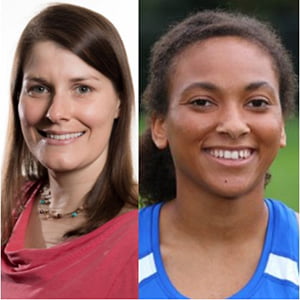
$118K NSF Grant Aids Hartwick Faculty-Student Research
On May 10, Hartwick College Assistant Professor of Biology Dr. Stephanie Carr ’06 and Tylisha Gourdine ’20 left campus to fly to Newport, OR, where they, along with other researchers, will move onto the research vessel Atlantis, from the Woods Hole Oceanographic Institute on Cape Cod.
They will then sail offshore to the Juan de Fuca Ridge, a 300-mile long underwater volcanic range located just off the coast. There, they will use a remotely operated vehicle to pump water from the oceanic crust using established subsurface observatories.
Backed by a recent National Science Foundation (NSF) grant of more than $118,000, Carr’s project, “Collaborative Research: Illuminating microbes and their viruses within the dark ocean crust through strain-level approaches,” is a collaboration on research undertaken with partners at the University of Hawaii and Hawaii Pacific University.
The deep subseafloor basement is one of the largest habitats for microbial life on earth, and encompasses roughly 70% of the Earth’s surface. This environment is connected to open ocean waters through exposed sea mountains (“seamounts”), some of which are hydrothermal vents. These seamounts allow ocean water to sink into the crust and circulate within the subsurface, like underground springs on the continents. Microorganisms live within these circulating waters.
Carr and her collaborators have analyzed the genomes from this location under a different research grant studied how the microorganisms thrive in the hot, oxygen-free crustal fluids. The results of the team’s research were published in The ISME Journal: Multidisciplinary Journal of Microbial Ecology earlier this year.
“By analyzing the DNA collected from the environment, we learned that the microorganism living within this extreme environment are similar to the microorganisms of early Earth,” said Carr, first author on the research paper. “They hold genes that evolved early in earth’s history, and may help us understand how life potential exists on other planets.
“Of course, analyzing the genomes of these microorganisms is just the first step,” she added. “The DNA provides us an outline of what is possible. Studying their growth in the laboratory would bring that blueprint to life.”
Inspired by their genomic studies, Carr and collaborators requested funds from the NSF to visit two deepsea observatories offshore Portland, OR for additional studies this year.
Carr, who also did undergraduate research and was a Freedman Prize winner while at Hartwick, selected Gourdine, a biochemistry major, to join her on this adventure.
“I’m excited because this is research that is new and not really studied, so any organisms we are able to cultivate have the chance to be newly discovered ones that could teach us how life started and maybe potentially be the key to finding life on other planets,” Gourdine said.
“As part of this research team, our role is to analyze the gaseous geochemistry of the crustal fluids, specifically to find microbes that make or use methane and carbon monoxide as part of their metabolism,” she added. “We hope that analyzing the chemistry will help us grow these unique organisms in the lab.”
Gourdine’s work also helped earn her a Freedman Prize in Geosciences.
Along with her work as a geochemist, Gourdine will also be obtaining experience with grant writing, budgeting, and other administrative aspects of managing a research project.
The pair will work on the Atlantis for two weeks before returning to Hartwick. Gourdine will continue to work with Carr for eight additional weeks this summer under the NFS fellowship.
“I’m hoping we bring back a lot of unique microorganisms,” says Carr, “I’m planning on engaging additional students with the growth of these organisms once we return because, if successful, we’re going to need help growing and understanding these potentially unique and never-before-studied organisms.”
Carr also relishes the opportunity to help current students get a similar experience to that which she had at the College.
“I’m an alumna who returned to Hartwick to teach in the Biology Department in 2017,” she said. “I really loved being a student at Hartwick. I liked the campus, the professors, and the student activities and clubs. Now I feel fortunate that I can give today’s students the same research and learning opportunities that I received.”
For more information on the NSF Grant and the research project, visit the project website. The entire research team will also be using various social media platforms to share their experiences, using the #SlowLifeFastLane hashtag.